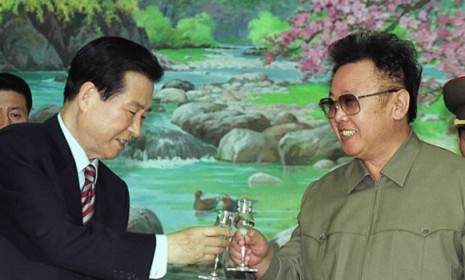Will Kim Jong Il's death make Korean reunification possible?
Now that North Korea's belligerent "Dear Leader" is gone, South Koreans are reconsidering the distant dream of a united peninsula

A free daily email with the biggest news stories of the day – and the best features from TheWeek.com
You are now subscribed
Your newsletter sign-up was successful
South Korean leaders are bracing for the unexpected in the wake of Kim Jong Il's death. After North Korea's enigmatic and volatile leader died, South Korean President Lee Myung Bak put his nation's military on the highest alert, apparently fearing potentially violent upheaval in the secretive, nuclear-armed North. At the same time, South Korea is also dusting off plans for something that long seemed impossible — peace. The two Koreas have been separated since 1945, and are still technically at war. Could Kim's death create a chance for North and South Korea to reunite?
This is a rare opportunity: Remember, South Korea's Lee Myung Bak, a practical former CEO, is the one who "reversed the South's nearly decade-long 'sunshine policy' of engagement with Pyongyang" in the first place, says Krista Mahr at TIME. Faced with a nuclear-bomb-happy counterpart across the border, Lee made his country's aid to the impoverished North contingent upon the dismantling of its arms program. "Now that Kim is gone, Lee could seize the moment to smooth things over."
"The Koreas: To reunify or not?"
The Week
Escape your echo chamber. Get the facts behind the news, plus analysis from multiple perspectives.

Sign up for The Week's Free Newsletters
From our morning news briefing to a weekly Good News Newsletter, get the best of The Week delivered directly to your inbox.
From our morning news briefing to a weekly Good News Newsletter, get the best of The Week delivered directly to your inbox.
The North won't reunite willingly: "Given the North's opposition to reunification," says Jayshree Bajoria of the Council on Foreign Relations, most experts believe "it is only possible in the near term if North Korea collapses." China wants to preserve the country as a communist "buffer zone between itself and democratic South Korea, and does not accept reunification on U.S. terms." Kim's death doesn't change that.
"Analysis: North Korea after Kim"
Be careful what you wish for: A rapid reunification, like the one Germany experienced in 1990, could financially devastate South Korea, says Emily Kaiser at Reuters. It would cost more than $1 trillion to accommodate the rush of opportunity-seeking North Koreans, who are 20 times poorer than their counterparts in the South. Seoul would be better off keeping the North as a "semi-autonomous investment enclave" for decades, so it can catch up slowly.
"Kim's death puts reunification back on agenda"
A free daily email with the biggest news stories of the day – and the best features from TheWeek.com
-
 How the FCC’s ‘equal time’ rule works
How the FCC’s ‘equal time’ rule worksIn the Spotlight The law is at the heart of the Colbert-CBS conflict
-
 What is the endgame in the DHS shutdown?
What is the endgame in the DHS shutdown?Today’s Big Question Democrats want to rein in ICE’s immigration crackdown
-
 ‘Poor time management isn’t just an inconvenience’
‘Poor time management isn’t just an inconvenience’Instant Opinion Opinion, comment and editorials of the day